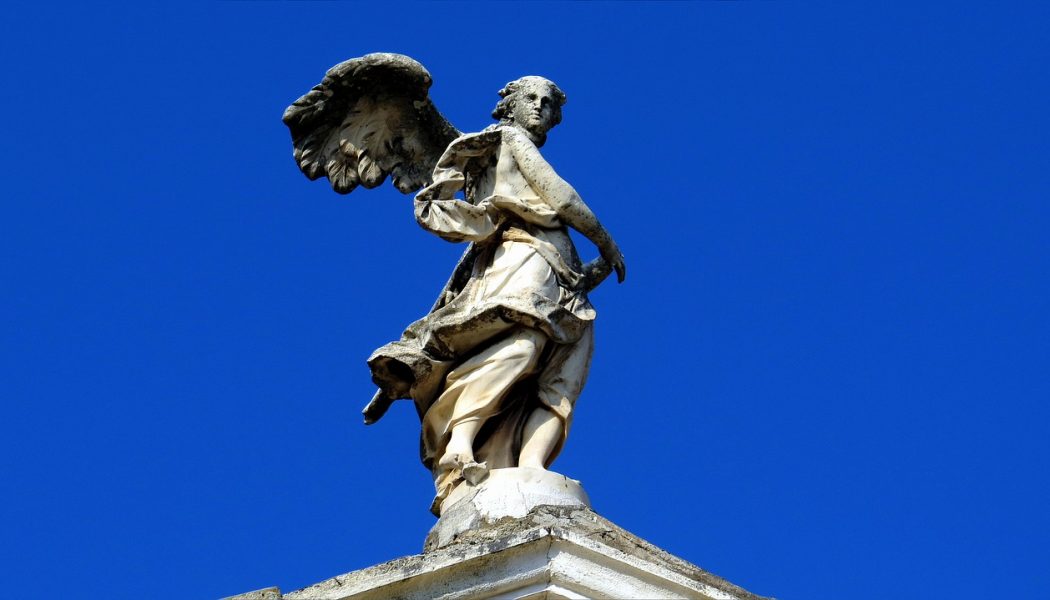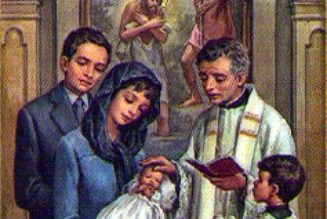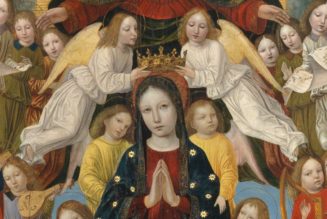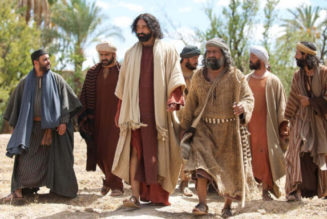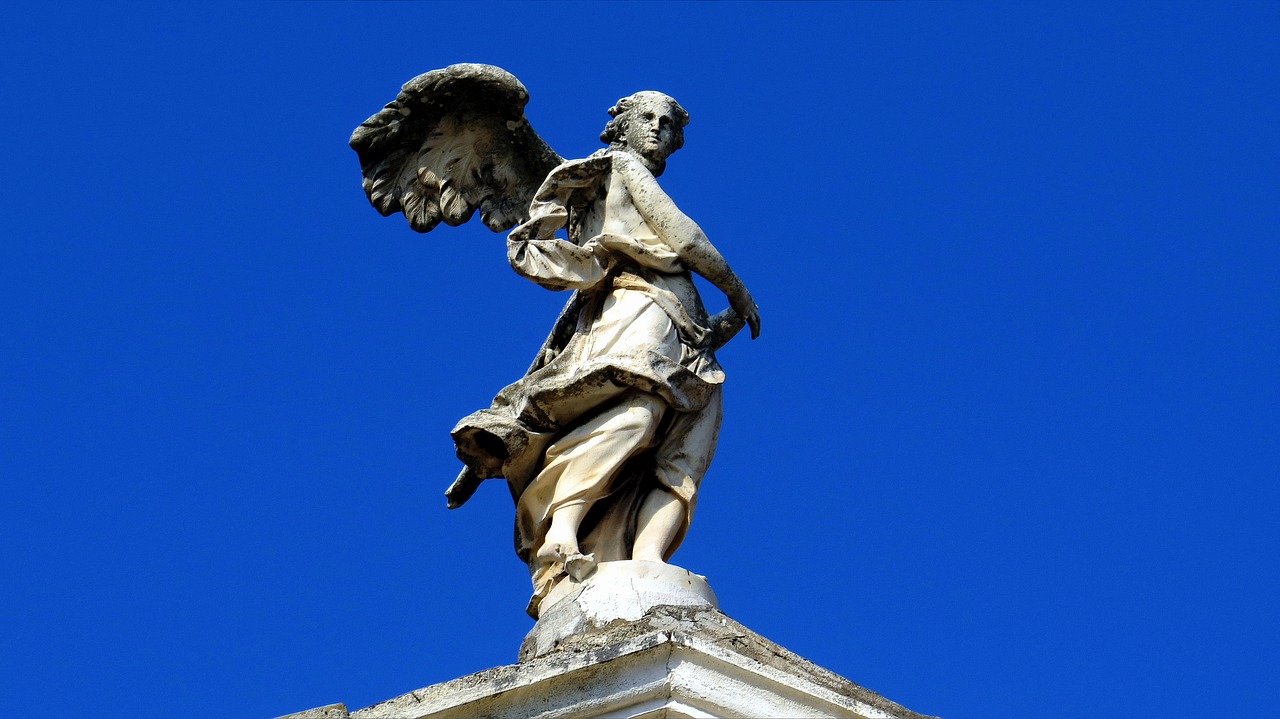
“For he will give his angels charge of you
to guard you in all your ways” (Ps. 91:11).
Angels are real — a vast variety of spirits who are more active in our lives than we might know. We should be mindful of them, particularly our guardian angels, and have a personal relationship with them. We should pray to them, speak to them whenever we think of them – and they will seek our attention if we but pay attention — whether or not we are in need. For they want to be with us in weal or in woe. They pray not just for us but with us, sharing in our spiritual and moral challenges and growth. We should thank them and bless them and honor them as the exalted yet humble fellow creatures they are, endowed by God with prodigious intelligence and powers they freely, lovingly, use for His glory and for our good.
It is commonly understood that angels were created early on during the six days of Genesis, and that they were endowed by God at their inception with all the knowledge and capabilities they would ever have – they do not change through experience. Accordingly, tradition holds that angels chose to submit to or rebel against their Maker at the instant they came to being. They are genderless and do not propagate their own kind, and each angel is so unique as to be a species unto itself. Angels are made in God’s image and likeness, as are we, with an intellect and free will; but they are in other essential ways very different, and mysterious – such as their division into three tiered hierarchies: Seraphim, Cherubim, and Thrones; Dominions, Virtues, and Powers; Principalities, Archangels, and Angels.
Angels are largely misunderstood, when they are not ignored. The word angel, from the Greek angelos, means “messenger.” But Psalm 103:20 states more pointedly their reason for being: “Bless the Lord, O you his angels, you mighty ones who do his word.” Angels exist first and foremost, as do we, to praise God and do His will. And it is primary to His will that angels watch over each of us – over our family, our country, history, the Church. Pope St. John XXIII said it was his guardian angel who told him to convoke the Second Vatican Council.
Jesus Himself said of His “little ones” that “their angels always behold the face of my Father” (Matt. 18:10) – thus establishing that we have guardian angels, and that angels are pure spirits, not subject to the laws of time and space, who bilocate.
I believe each of you reading this article has experienced the intervention of an angel in your life – perhaps unbeknown to you – whether to protect you from some grave danger or just to remind you of something important. I could tell of several instances when I felt sure angels intervened in my life or in the lives of others. Let me share with you one such remarkable story about a priest I know.
The young Father was driving a familiar route to a meeting when, unaccountably, he made a wrong turn. As he was maneuvering to get back on track, he came upon the scene of a dreadful traffic accident. Paramedics were working on a man who was terribly injured. The priest pulled over and asked the police if there was anything he could do, and, visibly relieved by his presence, they brought him to the injured man. He prayed over and blessed the man and gave him conditional absolution – and the man died. As he left, he received the heartfelt gratitude of the police and paramedics who were also blest, truly consoled, by the priest’s “happening by.”
It is in Scripture, in which angels appear more than one hundred times, that we learn about their larger, substantial role in salvation history, beyond their important role as guardian angels.
Twice in Matthew’s gospel Jesus speaks of the readiness of myriad angels to act in concert on His behalf as the Lord. When He rebukes Peter’s defense of Him in Gethsemane, Christ says: “Do you think that I cannot appeal to my Father, and he will at once send me more than twelve legions of angels?” (Matt 26:53). And at His final coming Christ predicts that He “will send out his angels with a loud trumpet call, and they will gather his elect from the four winds” (Matt. 24: 31).
In the Old Testament: The formidable angel with the flaming sword guards against our fallen parents’ return to Eden (angels mete out God’s justice as well as His mercy). Three angels tell Father Abraham and Sarah that at their advanced age they will have a son, Isaac, who will father forth the Covenant; and an angel intervenes to prevent Abraham from immolating that promised patriarch of the Covenant. Jacob is given a vision of angels ascending and descending the stairway to heaven as a sign that he has been entrusted with the Covenant. Moses’ angel guards and guides him in his conduct of the Covenant’s chosen people from bondage to freedom. Elijah, Isaiah, Ezekiel, and other prophets are commissioned and assisted, mystically enlightened, by angels in their proclamation of God’s Covenant. For the completion of his prophetic mission, for instance, Daniel is saved from the fiery furnace and the jaws of lions by the direct action of angels.
In the New Testament: An angel foretells to Zechariah the birth of John the Baptist, harbinger of the Messiah. The Blessed Virgin Mary is told by Archangel Gabriel that she is to bear the “Son of God” by the power of the Most High; and Gabriel receives her consent, her fiat, by which our Lord and Savior Jesus becomes Incarnate. An angel proclaims to shepherds the birth of the Messiah, and then a host of angels heralds His nativity. An angel assures Joseph about Mary’s virginal conception and then directs him to take Mother and Child to Egypt to protect the Divine Savior from Herod’s treachery. An Angel comforts and ministers to Jesus at two axial moments of His messianic life, his temptation in the desert and his agony in garden. Mary Magdalen and the other women are informed by two angels at the empty tomb about the Lord’s culminating salvific act: “He is not here; for he has risen” (Matt. 28:6). When Jesus ascends to heaven from among the apostles, two angels explain to them: “This Jesus, who was taken up from you into heaven, will come in the same way as you saw him go into heaven” (Acts 1:11). After the Ascension, Saints Peter, John, Paul, Philip, and others are all assisted and guided by angels in their mission of preaching the Gospel. Both Peter and Paul are sprung from prison by angels.
And in the Book of Revelation, the presence of angels abounds: angels unfurling portentous scrolls, pronouncing holy words of hope and condemnation, wielding wind and sickle and censer, astride earth and sun, blowing trumpets and sounding thunder, sowing plague and ruination – “flying in midheaven, with an eternal gospel to proclaim to those who dwell on earth” (Rev. 14:6).
Angels, heaven’s lordly lieges, are not incidental to our lives, nor are they inconsequential in the life of the world. They are integral, vital, to the Trinity’s plan for our well-being and redemption, and for the ultimate renewal of creation. They are not sentimental sprites, nor are they occult New Age demigods. They are magnificent, powerful but gentle beings who reflect God’s holiness and administer His goodness. They make up the heavenly court of Our Lady Queen of Angels whose bidding they diligently, joyfully, do. They love us and want to help us. We should take them seriously and pay them earnest devotion, and have confident and frequent recourse to them — and be glad in the hope that we will spend in friendship with them an eternity of bliss.
✠
*All Biblical passages are from the RSVCE.
Image by Katarzyna Tyl from Pixabay
